
Alina Dobreva
- Course: PhD Media and Communication
- PhD title: Information processing, interpersonal communication and post-communist audiences (Case of Bulgaria)
- Graduation: 2009
- Nationality: Bulgarian
- Job title: Policy Analyst at the European Parliament (European Parliamentary Research Service)
Why did you choose to study your PhD at the University of Leeds?
The most important thing for me was to do my PhD under the supervision of a person who shared my academic interests and devotion to the research project. I found such a supervisor in Leeds and I believed then and believe now that I made the right choice.
Tell us about the opportunities you took advantage of at Leeds.
My time in Leeds was challenging, as I had to support myself financially – not much time for extra-curricular activities. Nevertheless, doing a PhD in one of the best communications departments in Europe created a fruitful intellectual atmosphere and I took advantage of that. It also opened many doors for me during and after the PhD.
How has your experience of studying a PhD helped you in your career?
A PhD is not only about writing a thesis, it is also about the development of critical and analytical thinking, ability to multitask and be persistent. All these skills, which I enhanced in Leeds, helped me be a good researcher later on in the various fields I worked – academia, marketing research, polling, and currently policy research.
What advice would you give to future PhD students?
I chose my supervisor wisely and so should you. Find someone with interests similar to yours and approach them before you even apply. They will be happy to discuss your project with you and it will help you and your future supervisor to be a real team once you start the long trip towards the viva.
Take advantage of the plentiful networking opportunities that the School can provide you within the wider academic environment. The networking does not just lead to potential jobs, but also to your academic and personal development. It feeds your curiosity and there is nothing more important for a researcher than their vivid curiosity.

